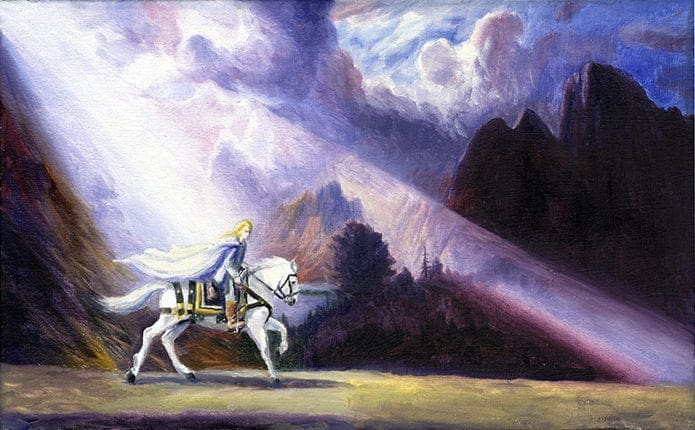
The mysterious ways of the brother Knights
By LORRAINE V. MURRAY, Commentary | Published February 23, 2017
Like many little girls, I sometimes fantasized about my future husband—and since I loved fairy tales, pictured him as a knight on horseback, who’d rescue me from whatever dragon was pursuing me.
My imagination didn’t provide specifics about this fellow, but my aunts had their own take on the matter. You see, whenever my older cousins wanted to date someone, the first question was, “Is he Italian?”
The man I eventually married didn’t stampede into my life on a horse, wielding a sword, nor did he trace his roots to Italy.
Instead, his forefathers hailed from the Deep South—and he was driving a green Volkswagen beetle named Arnold when we met.
As for rescuing me, there weren’t any dragons lurking around, but at times I wrangled with the demon of loneliness.
You see, my parents had died within six months of each other, leaving me alone in my 20s—and the prospect of a solitary future was daunting.
And then, one day, I met my knight—also known as Jeffrey Patrick Murray—and the rest, as they say, is history.
He found my contradictions charming, although I was largely unaware of them.
On our first date, for example, I launched into a vigorous defense of vegetarianism, then ordered a hamburger. An outspoken atheist, I nonetheless chose a Methodist church for our wedding.
Years later—after his conversion and my return to Mother Church—Jef joined the Knights of Columbus at St. Thomas More Parish.
The Knights were started by Father Michael J. McGivney—now on the path to sainthood—in 1882 in New Haven, Connecticut. And according to their website, Father McGivney wanted to “establish a group of men, united in their faith, who would provide for Catholic families in times of need.”
These men—who pledge fraternity, unity and charity—are committed to helping the poor in their communities, with special emphasis on widows and orphans.
Nowadays many folks associate the Knights with fish frys, and since Jef enjoyed pitching in on these events, our Fridays in Lent had a predictable routine.
I would drop him off early, so he could help in the kitchen, then return for supper, carrying a bottle of his homemade wine to share with friends.
After my knight-in-shining-armor died, his fellow Knights dedicated a fish fry to his memory, prayed for the repose of “Brother Jef’s” soul—and offered numerous favors.
One Knight, for example, provided rides from the airport for my out-of-town relatives, while another reinforced the basement door, after an attempted break-in at my house.
A third fellow rushed over, after I called him in a panic because there was a giant roach in the washing machine. And much to his eternal credit, he managed to rescue me while maintaining a straight face.
Although they get little publicity, the Knights at St. Thomas More do tons of good works, helping the sisters at the Gift of Grace home, supporting pro-life causes, assisting refugees, organizing the annual Veterans Day Mass, offering family-friendly events and more.
They pray the rosary before every meeting, and through their charitable works, they give witness to following the Gospel in today’s world.
Nowadays, they still remember Jef in prayers, invite me to picnics and bowling nights, provide help as needed—and give me a sense that they’ve “got my back.”
The Bible assures us God is “a father to the fatherless and defender of widows.” We know he works in mysterious ways through the hearts of ordinary people—like the Knights.
They don’t ride around on horseback, nor do they carry swords in everyday life, but in their own quiet ways, they slay many a dragon.
Artwork (“Glorfindel,” oil painting) by Jef Murray. Lorraine’s latest work of fiction is “Death Dons a Mask,” a comical mystery set at a small Decatur parish. Her email is lorrainevmurray@yahoo.com.